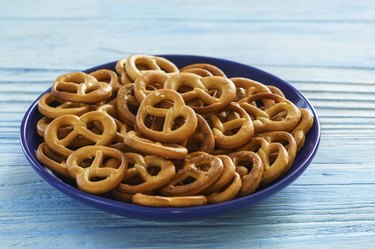
Snacks make up an important part of a balanced diet -- they help increase your nutrient intake, give you energy throughout the day and might prevent you from overeating at meals -- provided they're healthy snacks. Pretzels might represent a slightly better nutritional option than potato chips, but both should be occasional treats rather than a regular part of your diet.
Basic Nutritional Comparison
Video of the Day
Pretzels are lower in calories than potato chips. Each 2-ounce portion of pretzels contains 218 calories, compared to the 307 calories in an equivalent portion of potato chips. Both foods provide you with carbohydrates for energy -- 45 grams per serving of pretzels and 28 grams per serving of chips -- but pretzels offer a nutritional advantage when it comes to fat content. Each serving of potato chips contains 21 grams of fat, including 2.3 grams of saturated fat, while a serving of pretzels has just 2 grams of fat and less than half a gram of saturated fat. Limiting your saturated fat intake helps fight cardiovascular disease and helps keep your blood cholesterol levels at a safe level.
Video of the Day
Iron Content
Pretzels come out ahead of potato chips when it comes to iron content. Each 2-ounce serving of pretzels provides you with 3.1 milligrams of iron -- 39 percent of the daily recommended iron intake for men and 17 percent for women, according to the Institute of Medicine. An equivalent serving of chips contains just 0.9 milligrams. Iron not only helps your body detect the level of oxygen present in your tissues -- so that it can detect if any of your tissues are oxygen-starved -- but it also aids in oxygen storage and transport. Iron also promotes healthy immune function, while low iron levels cripple your immune system and leave you open to infection.
Vitamin Values
Pretzels contain more folic acid, but less vitamin E, than potato chips. Folic acid plays a key role in new cell growth because it allows your body to metabolize the amino acids and nucleic acids needed to build a new cell's proteins and DNA. Vitamin E promotes healthy cell communication and acts as an antioxidant, protecting your lipids from harmful oxidation. Each serving of pretzels provides you with 169 micrograms of folic acid -- 42 percent of your recommended daily intake, according to the Institute of Medicine -- while potato chips offer just 43 micrograms per serving. On the other hand, potato chips contain 3.8 milligrams of vitamin E per serving, or one-quarter of your daily vitamin E requirements, while pretzels contain almost no vitamin E.
Sizing Up the Sodium
Potato chips have a nutritional advantage over pretzels when it comes to sodium content. A portion of pretzels contains 652 milligrams of sodium -- almost half of your daily limit, according to the Institute of Medicine -- while potato chips contain 255 milligrams of sodium, or slightly less than one-fifth of your daily limit. Because of their salt content, pretzels increase your blood pressure, and consuming them regularly exposes you to the risks of a high sodium intake, such as kidney and heart damage. Potato chips are not only lower in salt, but they also contain more potassium than pretzels -- 931 milligrams, compared to pretzels' 164 milligrams. Consuming potassium counteracts the effects of sodium and makes you less sensitive to the sodium in your diet.
- North Dakota State University: Prairie Fare: Snacking Can Fill Nutrition Gaps
- USDA National Nutrient Database: Snacks, Pretzels, Hard, Plain, Salted
- USDA National Nutrient Database: Snacks, Potato Chips, Plain, Salted
- McKinley Health Center: Macronutrients: The Importance of Carbohydrate, Protein, and Fat
- Harvard School of Public Health: Fats and Cholesterol: Out With the Bad, In With the Good
- Linus Pauling Institute: Sodium (Chloride)
- Linus Pauling Institute: Potassium
- Linus Pauling Institute: Folic Acid
- Linus Pauling Institute: Iron
- Linus Pauling Institute: Vitamin E